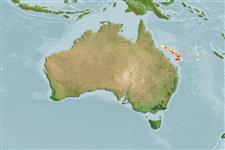>
Perciformes/Serranoidei (Groupers) >
Anthiadidae (Fairy basslets or Streamer basses)
Etymology: Plectranthias: Greek, plektron = anyhting to strike with, spur + Greek, anthias = a fish, Sparus aurata (Ref. 45335); robertsi: Named for Clive D. Roberts.
Eponymy: Dr Clive Douglas Roberts (b: 1952) was born in England and received a BSc (Zoology) at Queens University of Belfast. [...] (Ref. 128868), visit book page.
More on authors: Randall & Hoese.
Environment: milieu / climate zone / depth range / distribution range
Ecologia
marinhas batipelágico; intervalo de profundidade 220 - 400 m (Ref. 35216). Deep-water; 18°S - 23°S
Western Pacific: Queensland, Australia.
Tamanho / Peso / Idade
Maturity: Lm ? range ? - ? cm
Max length : 9.0 cm SL (female)
Found on the continental slope (Ref. 75154).
Life cycle and mating behavior
Maturidade | Reprodução | Desova | Ovos | Fecundidade | Larvas
Randall, J.E., 1996. Two new anthiine fishes of the genus Plectranthias (Perciformes: Serranidae), with a key to the species. Micronesica 29(2):113-131. (Ref. 26833)
Categoria na Lista Vermelha da IUCN (Ref. 130435: Version 2024-2)
Ameaça para o homem
Harmless
Utilização humana
Ferramentas
Relatórios especiais
Descarregue XML
Fontes da internet
Estimates based on models
Preferred temperature (Ref.
123201): 16 - 18.9, mean 17.6 °C (based on 5 cells).
Phylogenetic diversity index (Ref.
82804): PD
50 = 0.5000 [Uniqueness, from 0.5 = low to 2.0 = high].
Bayesian length-weight: a=0.01000 (0.00244 - 0.04107), b=3.04 (2.81 - 3.27), in cm total length, based on all LWR estimates for this body shape (Ref.
93245).
Nível Trófico (Ref.
69278): 3.8 ±0.6 se; based on size and trophs of closest relatives
Resiliência (Ref.
120179): Elevada, tempo mínimo de duplicação da população menor que 15 meses (Preliminary K or Fecundity.).
Fishing Vulnerability (Ref.
59153): Low vulnerability (10 of 100).
